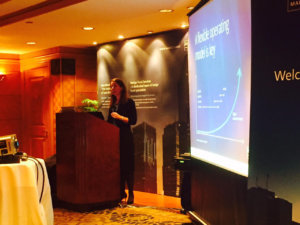Jack Ma goes for British deliverable FX in new smart domination by China
No longer do Chinese firms need partnerships with the West. Today, China is looking to absorb Western ingenuity into the Chinese corporate enormity, with FX and electronic banking being a major priority. We look at how today’s deal announcement by Ant Financial was foreseen by some of our industry’s most astute leaders.

Almost two years ago during a private invite-only summit in Hong Kong, FinanceFeeds met with senior executives of avantgarde, technology-focused electronic trading company Saxo Bank along with a series of hedge fund managers from across mainland China.
During the two hour seminar, some extremely important issues were discussed with regard to the essential evolution of the FX industry, led by Saxo Bank’s Executive Vice President and Global Head of Sales Strategy & Execution Jennifer Hansen.
“As we are very active participants in FinTech, where are we going? If you think about it, FinTech as a concept centered on how to approach the market is really only around 5 years old. The electronification of markets has been going on for a longtime but the idea of FinTech as a way to build financial institutions is quite new.” – Jennifer Hansen, Global Head of Institutional Business, Saxo Bank
“User experience is the product that is being sold these days” said Ms. Hansen, “and therefore financial services products must be sold in a way that suits our digital habits. Google, Apple, Facebook, Amazon, Alibaba all took this lead in the consumer market place, and therefore we can tell that experience in one industry seems to affect experience in other industries and this was a wake up call for the financial industry which took everyone by surprise. We have seen evidence of this type of movement in the robo advisory and payments sectors, and new entrants into those two areas took traditional banks by surprise with regard to how quickly they could garner clients” she said.

Interestingly, she has been proven correct and Saxo Bank is probably one of the companies that understands this direction very clearly, especially since its vast expansion across the Chinese markets and subsequent but necessary sale of 51.5% of the firm to Chinese motor manufacturing giant Geely.
Since that time, small companies offering electronic trading and FX brokerage services without their own infrastructure and with no presence in China have been under the extremely accurate microscope of the Chinese authorities who frown on firms from outside the country being able to access client bases in the People’s Republic and, totally against Communist ethos, transfer their funds outside the country and operate financial transactions on the free market.
Companies which maintained fully Chinese operations have been perfectly fine.
Almost two years since that dialog, Ms Hansen has been proven correct in her analogy that the electronic trading and FX business could follow the user experience of large internet and e-commerce companies, as today, Ant Financial, partly owned by Alibaba, one of the firms alluded to during the aforementioned meeting in Hong Kong, is in advanced talks to buy British currency exchange start-up WorldFirst in a deal that could be worth up to $700 million (£550 million).
Ant Financial could complete the takeover within weeks with the company having been in talks with WorldFirst for months, potentially creating a deal that could value the British currency exchange firm at “hundreds of millions” of pounds according to analysts in London.
Roughly one-third owned by Alibaba, Ant Financial was recently valued at $150 billion and the company has signalled its intentions to go public.
Earlier this year e-commerce giant Alibaba, founded by influential businessman Jack Ma, opened two data centers in London, signalling its first official expansion onto British shores. The centers will power Alibaba’s cloud services in the UK, allowing it to effectively disseminate its services to British businesses as it seeks to compete with rivals Amazon, Google and Microsoft.
Earlier this year it opened cloud data centers in Frankfurt as it moved into Europe.
During the meeting in Hong Kong two years ago that was attended by FinanceFeeds, Saxo Bank’s Ms Hansen said “Banks handled the arrival of new, more advanced and adaptable participants badly, and lots of ‘us vs them’ provocative headlines adorned the newspapers, asking whether traditional banking had become obsolete and whether modern, FinTech-led companies would take over.”
She was quite right about that too, as new entities that offer traditional banking services without branches and via apps have sprung up across the UK over the past two years, one notable example being Revolut which has garnered massive attention from a very analytical self-empowered retail audience across the country by offering banking and investment products via a completely mobile-first platform which empowers its customers when they make FX transfers across the world rather than penalizes them in the way that traditional high street banks do.
Ant Financial’s move for WorldFirst would further signal Chinese firms’ intent to move into Europe and expand their reach globally, which builds on the dialog that has taken place at many FX industry conferences in mainland China over the past two years.
China’s purchasing power, government backing and millimetric organizational abilities lines it up as a very strong contender to bring Chinese FX technology and new banking methodologies to the rest of the world via large scale mergers, thus gone are the days when Chinese partners needed Western firms.
2019 is likely to be the year in which China buys up its partners and expands into the West via ownership.









